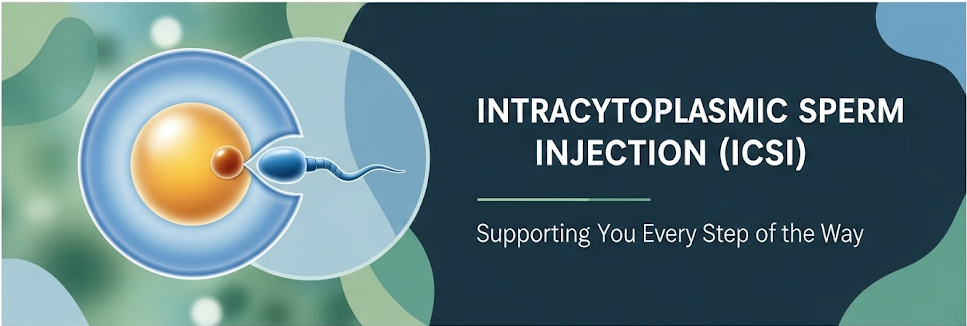Intracytoplasmic Sperm Injection (ICSI): A Breakthrough in Fertility Treatment
Infertility affects millions of couples worldwide, and advancements in assisted reproductive technology (ART) have provided hope for those struggling to conceive. Among these innovations, Intracytoplasmic Sperm Injection (ICSI) has emerged as a groundbreaking technique that has revolutionized fertility treatment. ICSI is a specialized form of in vitro fertilization (IVF) that addresses male infertility issues by directly injecting a single sperm into an egg. This article delves into the intricacies of ICSI, its procedure, benefits, risks, and its role in modern fertility treatments.
What is Intracytoplasmic Sperm Injection (ICSI)?
ICSI is an advanced laboratory procedure used in conjunction with IVF to treat severe male infertility. It involves the direct injection of a single sperm into the cytoplasm of a mature egg to facilitate fertilization. This technique is particularly beneficial for couples where the male partner has a low sperm count, poor sperm motility, or abnormal sperm morphology. ICSI can also be used in cases of previous IVF failure, unexplained infertility, or when sperm must be surgically retrieved.
The development of ICSI in the early 1990s marked a significant milestone in reproductive medicine, offering new hope to couples who previously had limited options for conception. Today, ICSI is widely used in fertility clinics around the world and has helped countless couples achieve their dream of parenthood.
How Does ICSI Work?
The ICSI procedure is a highly precise and delicate process that requires specialized equipment and expertise. It is typically performed as part of an IVF cycle and involves the following steps:
- Ovarian Stimulation: The female partner undergoes hormonal stimulation to produce multiple mature eggs. This is monitored through blood tests and ultrasounds to determine the optimal time for egg retrieval.
- Egg Retrieval: Once the eggs are mature, they are retrieved from the ovaries using a minimally invasive procedure called transvaginal ultrasound-guided follicular aspiration. This is performed under sedation or anesthesia.
- Sperm Collection: The male partner provides a semen sample on the same day as the egg retrieval. In cases of severe male infertility, sperm may be surgically extracted from the testicles or epididymis using techniques such as testicular sperm extraction (TESE) or percutaneous epididymal sperm aspiration (PESA).
- Sperm Preparation: The sperm sample is processed in the laboratory to isolate the healthiest and most motile sperm for injection.
- ICSI Procedure: Using a specialized micromanipulation system, an embryologist selects a single sperm and immobilizes it. The sperm is then injected directly into the cytoplasm of a mature egg using a fine glass needle. This process is repeated for each egg.
- Fertilization and Embryo Development: The injected eggs are monitored for signs of fertilization. Successful fertilization typically occurs within 18-24 hours, and the resulting embryos are cultured in the laboratory for 3-5 days.
- Embryo Transfer: One or more healthy embryos are selected and transferred into the female partner’s uterus. Any remaining viable embryos can be frozen for future use.
- Pregnancy Test: A blood test is conducted approximately 10-14 days after the embryo transfer to determine if pregnancy has been achieved.
Who Can Benefit from ICSI?
ICSI is primarily recommended for couples facing male infertility issues, but it can also be used in other scenarios. The following are some common indications for ICSI:
- Severe Male Infertility: ICSI is ideal for men with low sperm count (oligospermia), poor sperm motility (asthenospermia), or abnormal sperm morphology (teratospermia).
- Previous IVF Failure: Couples who have experienced failed fertilization in previous IVF cycles may benefit from ICSI.
- Surgical Sperm Retrieval: Men who have undergone vasectomy or have blockages in the reproductive tract may require surgical sperm retrieval, which is often paired with ICSI.
- Unexplained Infertility: In cases where the cause of infertility cannot be identified, ICSI may improve the chances of fertilization.
- Frozen Sperm or Eggs: ICSI is often used when frozen sperm or eggs are of lower quality.
- Genetic Testing: ICSI can be combined with preimplantation genetic testing (PGT) to screen embryos for genetic disorders.
Advantages of ICSI
ICSI offers several advantages over conventional IVF, particularly for couples dealing with male infertility. Some of the key benefits include:
- Higher Fertilization Rates: ICSI significantly improves the chances of fertilization, even with poor-quality sperm.
- Overcoming Severe Male Infertility: ICSI enables fertilization in cases where natural conception or standard IVF would be unlikely.
- Reduced Risk of Fertilization Failure: By directly injecting sperm into the egg, ICSI eliminates the risk of failed fertilization due to sperm-related issues.
- Genetic Screening Compatibility: ICSI can be combined with PGT to identify and select embryos free of genetic abnormalities.
- Versatility: ICSI can be used with fresh or frozen sperm and eggs, making it a flexible option for various fertility challenges.
Risks and Limitations of ICSI
While ICSI is a highly effective fertility treatment, it is not without risks and limitations. Some potential concerns include:
- Embryo Damage: The ICSI procedure involves manipulating the egg and sperm, which carries a small risk of damaging the egg or embryo.
- Multiple Pregnancies: As with IVF, transferring multiple embryos increases the risk of twins or higher-order multiples, which can lead to complications for both the mother and babies.
- Birth Defects: Some studies suggest a slightly higher risk of birth defects in children conceived through ICSI, though the overall risk remains low.
- Genetic Risks: Men with severe infertility may pass genetic abnormalities to their offspring. Genetic counseling is recommended before undergoing ICSI.
- Cost: ICSI is more expensive than conventional IVF due to the additional laboratory procedures involved.
Success Rates of ICSI
The success of ICSI depends on various factors, including the age of the female partner, the quality of the eggs and sperm, and the expertise of the fertility clinic. On average, the fertilization rate with ICSI is approximately 70-80%, and the pregnancy rate per cycle is comparable to that of standard IVF. However, success rates decline with advancing maternal age, particularly after the age of 35.
Ethical Considerations
ICSI has raised several ethical questions, particularly regarding the selection and manipulation of sperm and embryos. Some concerns include:
- Genetic Selection: The ability to select specific sperm for injection raises questions about the potential for “designer babies.”
- Informed Consent: Couples must be fully informed about the risks, benefits, and limitations of ICSI before proceeding.
- Long-Term Effects: The long-term health outcomes of children born through ICSI are still being studied, and ongoing research is essential.
The Future of ICSI
As reproductive technology continues to evolve, ICSI is likely to become even more refined and effective. Advances in genetic screening, sperm selection techniques, and embryo culture methods are expected to improve success rates and reduce risks. Additionally, research into the genetic and epigenetic effects of ICSI will provide valuable insights into the long-term health of children conceived through this method.
Conclusion
Intracytoplasmic Sperm Injection (ICSI) has transformed the landscape of fertility treatment, offering hope to couples facing severe male infertility and other reproductive challenges. By enabling fertilization in cases where it was once thought impossible, ICSI has helped countless individuals achieve their dream of parenthood. However, like any medical procedure, ICSI comes with risks and ethical considerations that must be carefully weighed. For couples considering ICSI, consulting with a fertility specialist and undergoing genetic counseling can provide valuable guidance and support. With continued advancements in reproductive technology, the future of ICSI looks promising, paving the way for even greater success in overcoming infertility.
New chat





